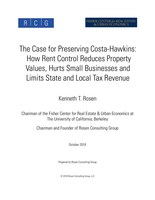BERKELEY, Calif., Oct. 22, 2018 /PRNewswire/ -- The Costa-Hawkins Rental Housing Act was a bipartisan compromise designed to allow local jurisdictions to adopt rent control, while establishing a pragmatic framework that prevents cities from adopting excessively restrictive rules. Proposition 10 on the ballot this November would repeal this compromise and allow for unlimited forms of rent control, an approach that would significantly reduce property values and could take millions in tax revenue away from school districts and local communities.
"If Prop. 10 passes and cities expand rent control, the potential decline in apartment property values is in the 10% to 35% range," said Ken Rosen, Chairman of UC Berkeley's Fisher Center for Real Estate & Urban Economics and Chairman and Founder of Rosen Consulting Group. "Schools districts across the state, which rely heavily on property tax revenue, could lose hundreds of millions of dollars per year," said Rosen.
"The Case for Preserving Costa-Hawkins: How Rent Control Reduces Property Values, Hurts Small Businesses and Limits State and Local Tax Revenue," was released today by Rosen Consulting Group and the Fisher Center for Real Estate & Urban Economics at University of California, Berkeley. The report, the fourth in a series of papers examining the economic and housing market impact of rent control, details the numerous unintended negative consequences likely to result if Costa-Hawkins is repealed. If cities adopt stricter forms of rent control major impacts would include: 1) a significant drop in apartment property values; 2) deferred maintenance on existing properties and a deterioration in housing quality; 3) lost revenue that will squeeze thousands of small mom-and-pop businesses; and 4) a decline in state and local tax revenue that will limit funding for school districts and strain city and county budgets.
The full report is available here.
Previous reports in this series:
- Three Ways Rent Control Reduces the Supply of Rental Housing
- Who Really Benefits from Rent Control?
- The Potential Impacts of Rent Control on Single Family Homes
About Rosen Consulting Group
Rosen Consulting Group (RCG) is a leading independent real estate economics consulting firm. Founded in 1990 and with offices in Berkeley and New York, RCG provides strategic consulting and unbiased investment guidance through all market cycles. For more information, go to www.rosenconsulting.com.
About the Fisher Center for Real Estate & Urban Economics
The Fisher Center for Real Estate & Urban Economics (FCREUE) mission is to educate students and real estate professionals, and to support and conduct research on real estate, urban economics, and the California economy. FCREUE strives to be the leading center for research on the California economy and excels nationally as a center for urban economic and public policy research. It regularly provides a practical forum for academics, government officials, and business leaders. For more information, go to http://groups.haas.berkeley.edu/realestate.
SOURCE Rosen Consulting Group
Related Links
WANT YOUR COMPANY'S NEWS FEATURED ON PRNEWSWIRE.COM?
Newsrooms &
Influencers
Digital Media
Outlets
Journalists
Opted In

Share this article